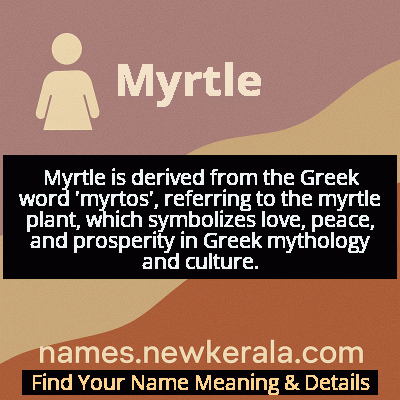Myrtle Name Meaning & Details
Origin, Popularity, Numerology Analysis & Name Meaning of Myrtle
Discover the origin, meaning, and cultural significance of the name MYRTLE. Delve into its historical roots and explore the lasting impact it has had on communities and traditions.
Name
Myrtle
Gender
Female
Origin
Greek
Lucky Number
3
Meaning of the Name - Myrtle
Myrtle is derived from the Greek word 'myrtos', referring to the myrtle plant, which symbolizes love, peace, and prosperity in Greek mythology and culture.
Myrtle - Complete Numerology Analysis
Your Numerology Number
Based on Pythagorean Numerology System
Ruling Planet
Jupiter
Positive Nature
Optimistic, inspirational, and creative.
Negative Traits
Scattered, exaggerating.
Lucky Colours
Yellow, gold, purple.
Lucky Days
Thursday.
Lucky Stones
Yellow sapphire.
Harmony Numbers
1, 2, 9.
Best Suited Professions
Arts, writing, communication.
What People Like About You
Creativity, optimism.
Famous People Named Myrtle
Myrtle Gonzalez
Silent Film Actress
One of the first Latin American movie stars in Hollywood, appearing in over 80 silent films
Myrtle Fillmore
Religious Leader
Co-founder of the Unity Church movement and spiritual teacher
Myrtle Corbin
Medical Phenomenon
Famous dipygus who lived a full life and had five children
Myrtle Reed
Author
Bestselling American novelist and poet known for romantic fiction
Name Variations & International Equivalents
Click on blue names to explore their detailed meanings. Gray names with will be available soon.
Cultural & Historical Significance
Extended Personality Analysis
Women named Myrtle are often characterized by a unique blend of traditional values and quiet strength. They typically exhibit nurturing qualities and a deep connection to family and home, reflecting the name's association with domestic happiness and marriage. Myrtles tend to be practical, grounded individuals who value stability and continuity, often serving as the emotional anchor in their relationships. Their personality often includes a strong aesthetic sense and appreciation for natural beauty, whether expressed through gardening, crafts, or artistic pursuits. While sometimes perceived as reserved or old-fashioned, Myrtles possess inner resilience and adaptability that allows them to weather life's challenges with grace. They are typically excellent problem-solvers who approach difficulties with patience and determination. Their loyalty runs deep, and they form enduring friendships based on mutual trust and understanding. The combination of their traditional outlook and quiet confidence often makes them respected figures in their communities, valued for their wisdom and reliability.
Modern Usage & Popularity
In contemporary naming practices, Myrtle represents an interesting case of a vintage name poised for potential revival. After falling out of favor for most of the 20th century, the name is beginning to attract attention from parents seeking unique, botanical names with historical depth. Current usage remains modest but shows gradual increase, particularly in countries like the United Kingdom and Australia where vintage revivals tend to gain traction first. The name's association with strong literary characters (particularly from F. Scott Fitzgerald's 'The Great Gatsby' and J.K. Rowling's Harry Potter series) has helped maintain cultural relevance. Modern parents choosing Myrtle often appreciate its connection to nature, its vintage charm, and its distinctiveness in an era of more common names. The growing trend of great-grandmother names returning to fashion, combined with increased interest in plant-based names, suggests Myrtle may continue its slow but steady return to usage. Its versatility with nicknames like Myrty, Tillie, or Myra makes it adaptable for modern children while preserving its traditional essence.
Symbolic & Spiritual Meanings
The symbolic meanings associated with Myrtle are remarkably rich and multifaceted, drawing from botanical, mythological, and cultural sources. The myrtle plant's evergreen nature represents immortality, eternal life, and enduring love, while its fragrant white flowers symbolize purity, innocence, and spiritual enlightenment. In mythological contexts, myrtle signifies divine love and protection, having been sacred to Aphrodite and Venus. The plant's use in wedding traditions across cultures reinforces its association with marital happiness, fertility, and domestic bliss. Medicinally, myrtle has been used for centuries for its healing properties, adding layers of meaning related to health, protection, and purification. The plant's ability to thrive in various conditions symbolizes adaptability, resilience, and the capacity to find beauty and purpose in challenging circumstances. In psychological terms, the name evokes qualities of peace, harmony, and emotional balance. The myrtle's role in various religious ceremonies connects it to themes of devotion, faithfulness, and spiritual growth, making the name carry profound symbolic weight that transcends its simple botanical origins.

